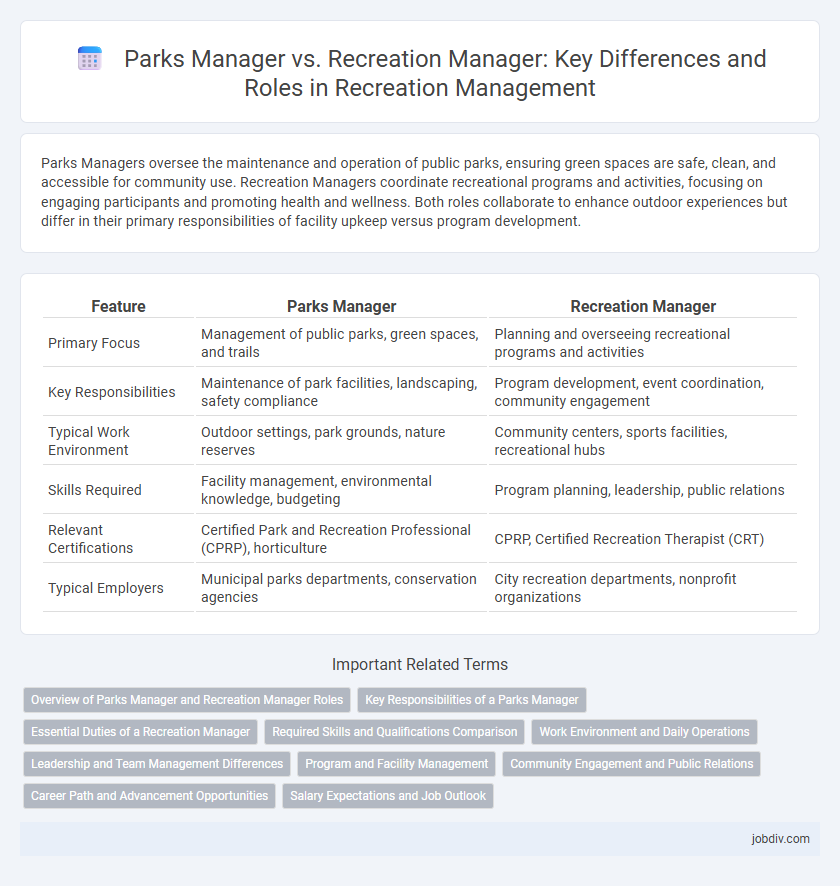Parks Managers oversee the maintenance and operation of public parks, ensuring green spaces are safe, clean, and accessible for community use. Recreation Managers coordinate recreational programs and activities, focusing on engaging participants and promoting health and wellness. Both roles collaborate to enhance outdoor experiences but differ in their primary responsibilities of facility upkeep versus program development.
Table of Comparison
| Feature | Parks Manager | Recreation Manager |
|---|---|---|
| Primary Focus | Management of public parks, green spaces, and trails | Planning and overseeing recreational programs and activities |
| Key Responsibilities | Maintenance of park facilities, landscaping, safety compliance | Program development, event coordination, community engagement |
| Typical Work Environment | Outdoor settings, park grounds, nature reserves | Community centers, sports facilities, recreational hubs |
| Skills Required | Facility management, environmental knowledge, budgeting | Program planning, leadership, public relations |
| Relevant Certifications | Certified Park and Recreation Professional (CPRP), horticulture | CPRP, Certified Recreation Therapist (CRT) |
| Typical Employers | Municipal parks departments, conservation agencies | City recreation departments, nonprofit organizations |
Overview of Parks Manager and Recreation Manager Roles
Parks managers oversee the maintenance, preservation, and development of public parklands, ensuring natural resources and recreational facilities meet community needs. Recreation managers plan and coordinate leisure activities, sports programs, and community events to promote public well-being and engagement. Both roles require strong leadership and organizational skills but focus respectively on outdoor space management and activity programming.
Key Responsibilities of a Parks Manager
Parks Managers oversee the maintenance, safety, and development of public parks, ensuring green space accessibility and environmental sustainability. They coordinate groundskeeping staff, manage budgets for park improvements, and enforce regulations to preserve natural resources. Their key responsibilities include planning recreational facilities, organizing community events, and fostering partnerships with local organizations to enhance park usage.
Essential Duties of a Recreation Manager
A Recreation Manager oversees the planning, development, and implementation of leisure programs and activities designed to enhance community engagement and well-being. Key duties include managing recreation staff, coordinating facility operations, ensuring safety compliance, and evaluating program effectiveness to meet the diverse needs of participants. This role emphasizes strategic program development, budget management, and fostering partnerships to promote inclusive and accessible recreational opportunities.
Required Skills and Qualifications Comparison
Parks Managers require expertise in environmental management, landscape architecture, and facility maintenance, along with strong leadership and budgeting skills. Recreation Managers prioritize skills in program development, community engagement, and staff coordination, often needing certifications in fitness or leisure services. Both roles demand excellent communication, strategic planning, and knowledge of local regulations and safety standards.
Work Environment and Daily Operations
Parks Managers typically oversee the maintenance and preservation of natural spaces, managing outdoor environments such as public parks, greenways, and recreational trails, while coordinating with groundskeepers and environmental specialists. Recreation Managers focus on organizing and directing programs, events, and activities within community centers, sports facilities, or recreational complexes, ensuring participant engagement and safety. Both roles require strong leadership and communication skills but differ in their primary work settings and operational priorities, with Parks Managers emphasizing habitat stewardship and Recreation Managers prioritizing program delivery.
Leadership and Team Management Differences
Parks Managers concentrate on overseeing park maintenance teams and coordinating with groundskeepers to ensure facility upkeep and environmental conservation, emphasizing operational leadership and safety compliance. Recreation Managers lead program coordinators and activity staff to design and implement community events, focusing on participant engagement and resource allocation. Differences in leadership styles stem from Parks Managers prioritizing logistical efficiency and facility management, while Recreation Managers emphasize team motivation and dynamic program development.
Program and Facility Management
Parks Managers specialize in overseeing the maintenance and development of outdoor spaces, ensuring that parks and natural areas provide safe, accessible environments for public use. Recreation Managers focus on designing, implementing, and evaluating recreational programs and activities to meet community needs and enhance participant engagement. Both roles collaborate to optimize facility management and program delivery, balancing natural resource preservation with diverse recreational offerings.
Community Engagement and Public Relations
Parks Managers oversee the maintenance and operations of public green spaces, emphasizing community engagement through organizing local events and volunteer programs that foster stewardship and promote environmental awareness. Recreation Managers focus on developing and managing recreational programs and activities, leveraging public relations strategies to increase participation and tailor services to community needs. Both roles require strong communication skills to build relationships with stakeholders and enhance public involvement in recreational opportunities.
Career Path and Advancement Opportunities
Parks Managers typically advance through roles focused on park operations, natural resource management, and facility maintenance, often gaining expertise in environmental stewardship and public safety, which opens opportunities for senior positions in municipal or regional park systems. Recreation Managers usually progress by developing specialized skills in program planning, community engagement, and facility coordination, leading to leadership roles that oversee diverse recreational services, including sports leagues and cultural events. Both career paths offer advancement opportunities into executive positions such as Director of Parks and Recreation or Regional Recreation Coordinator, emphasizing strategic planning and budget management.
Salary Expectations and Job Outlook
Parks Managers typically earn a median salary of $58,000 annually, overseeing park maintenance and natural resource conservation, while Recreation Managers command a higher median salary of $65,000, focusing on program development and community engagement. Job outlook for both positions is projected to grow around 6% over the next decade, driven by increased public investment in outdoor spaces and recreational services. Recreation Managers often experience greater demand due to expanding leisure activities and wellness programs, offering more diverse career advancement opportunities compared to Parks Managers.
Parks Manager vs Recreation Manager Infographic

 jobdiv.com
jobdiv.com